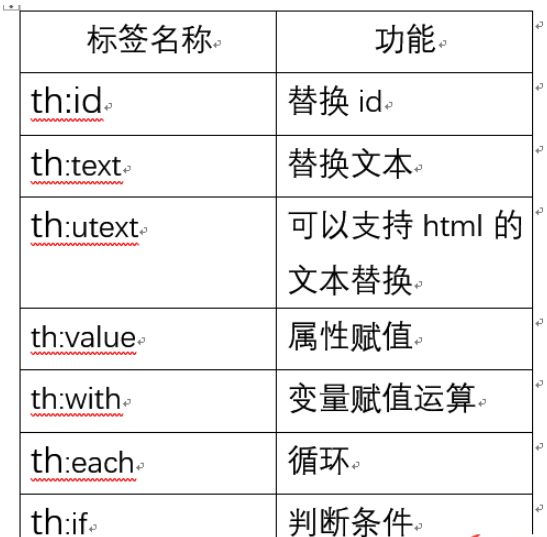1. thymeleaf入门
1.1 引入坐标
<!--springBoot整合thymeleaf--> <dependency> <groupId>org.springframework.boot</groupId> <artifactId>spring-boot-starter-thymeleaf</artifactId> </dependency>
1.2 编写controller类
@GetMapping("/index")
public String index(Model model){
model.addAttribute("msg","hello");
return "index";
}
1.3 前端页面
页面中的html标签必须添加这个地址,否则无法使用thymeleaf,且html标签内只能写这个网址,如果添加其他网址,则会造成页面异常。
异常:

<html lang="en" xmlns:th="http://www.thymeleaf.org">
<cite th:text="${msg}">王超</cite>
结果为cite标签里的内容“王超”被替换为hello.
th:text 是thymeleaf的语法之一,他的作用就是文本替换。不管标签内是否有内容,都会被替换成存储的内容。同时也要注意 thymeleaf比较严格,如果标签取不到值就会报错。

常见的thymeleaf便签如下:

在实际开发中由于ModelAndView是request级别的,所以如果要在其他页面也展示数据,就需要使用session进行存储。最常见的就是登陆之后要在index页面展示用户信息。
2. thymeleaf使用session内置对象(不推荐)
2.1 controller类
HttpServletRequest request = HttpContextUtil.getHttpServletRequest();
request.getSession().setAttribute("user", (SysUser)SecurityUtils.getSubject().getPrincipal());
2.2 前台页面
<cite th:text="${session.user.getUsername()}">王超</cite>
我登陆的账号名称是admin,所以标签内的王超会被替换为admin。如果用model的话是无法获取到username的值,页面会报错。所以需要用session进行会话存储,但是thymeleaf不推荐使用内置对象。
以上是Springboot中如何整合thymleaf模板引擎的详细内容。更多信息请关注PHP中文网其他相关文章!
 Java平台是否独立,如果如何?May 09, 2025 am 12:11 AM
Java平台是否独立,如果如何?May 09, 2025 am 12:11 AMJava是平台独立的,因为其"一次编写,到处运行"的设计理念,依赖于Java虚拟机(JVM)和字节码。1)Java代码编译成字节码,由JVM解释或即时编译在本地运行。2)需要注意库依赖、性能差异和环境配置。3)使用标准库、跨平台测试和版本管理是确保平台独立性的最佳实践。
 关于Java平台独立性的真相:真的那么简单吗?May 09, 2025 am 12:10 AM
关于Java平台独立性的真相:真的那么简单吗?May 09, 2025 am 12:10 AMJava'splatFormIndenceIsnotsimple; itinvolvesComplexities.1)jvmCompatiblemustbeiblemustbeensurecensuredAcrospPlatForms.2)nativelibrariesandsycallsneedcarefulhandling.3)
 Java平台独立性:Web应用程序的优势May 09, 2025 am 12:08 AM
Java平台独立性:Web应用程序的优势May 09, 2025 am 12:08 AMJava'splatformindependencebenefitswebapplicationsbyallowingcodetorunonanysystemwithaJVM,simplifyingdeploymentandscaling.Itenables:1)easydeploymentacrossdifferentservers,2)seamlessscalingacrosscloudplatforms,and3)consistentdevelopmenttodeploymentproce
 JVM解释:Java虚拟机的综合指南May 09, 2025 am 12:04 AM
JVM解释:Java虚拟机的综合指南May 09, 2025 am 12:04 AMthejvmistheruntimeenvorment forexecutingjavabytecode,Cocucialforjava的“ WriteOnce,RunanyWhere”能力
 Java的主要功能:为什么它仍然是顶级编程语言May 09, 2025 am 12:04 AM
Java的主要功能:为什么它仍然是顶级编程语言May 09, 2025 am 12:04 AMJavaremainsatopchoicefordevelopersduetoitsplatFormentence,对象与方向设计,强度,自动化的MememoryManagement和ComprechensivestAndArdArdArdLibrary
 Java平台独立性:这对开发人员意味着什么?May 08, 2025 am 12:27 AM
Java平台独立性:这对开发人员意味着什么?May 08, 2025 am 12:27 AMJava'splatFormIndependecemeansDeveloperScanWriteCeandeCeandOnanyDeviceWithouTrecompOlding.thisAcachivedThroughThroughTheroughThejavavirtualmachine(JVM),WhaterslatesbyTecodeDecodeOdeIntComenthendions,允许univerniverSaliversalComplatibilityAcrossplatss.allospplats.s.howevss.howev
 如何为第一次使用设置JVM?May 08, 2025 am 12:21 AM
如何为第一次使用设置JVM?May 08, 2025 am 12:21 AM要设置JVM,需按以下步骤进行:1)下载并安装JDK,2)设置环境变量,3)验证安装,4)设置IDE,5)测试运行程序。设置JVM不仅仅是让其工作,还包括优化内存分配、垃圾收集、性能调优和错误处理,以确保最佳运行效果。
 如何查看产品的Java平台独立性?May 08, 2025 am 12:12 AM
如何查看产品的Java平台独立性?May 08, 2025 am 12:12 AMtoensurejavaplatFormIntence,lofterTheSeSteps:1)compileAndRunyOpplicationOnmultPlatFormSusiseDifferenToSandjvmversions.2)upureizeci/cdppipipelinelikeinkinslikejenkinsorgithikejenkinsorgithikejenkinsorgithikejenkinsorgithike forautomatecross-plateftestesteftestesting.3)


热AI工具

Undresser.AI Undress
人工智能驱动的应用程序,用于创建逼真的裸体照片

AI Clothes Remover
用于从照片中去除衣服的在线人工智能工具。

Undress AI Tool
免费脱衣服图片

Clothoff.io
AI脱衣机

Video Face Swap
使用我们完全免费的人工智能换脸工具轻松在任何视频中换脸!

热门文章

热工具

DVWA
Damn Vulnerable Web App (DVWA) 是一个PHP/MySQL的Web应用程序,非常容易受到攻击。它的主要目标是成为安全专业人员在合法环境中测试自己的技能和工具的辅助工具,帮助Web开发人员更好地理解保护Web应用程序的过程,并帮助教师/学生在课堂环境中教授/学习Web应用程序安全。DVWA的目标是通过简单直接的界面练习一些最常见的Web漏洞,难度各不相同。请注意,该软件中

Atom编辑器mac版下载
最流行的的开源编辑器

VSCode Windows 64位 下载
微软推出的免费、功能强大的一款IDE编辑器

SublimeText3 Mac版
神级代码编辑软件(SublimeText3)

ZendStudio 13.5.1 Mac
功能强大的PHP集成开发环境





